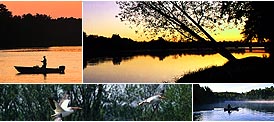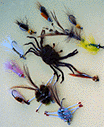

Alligator Hunting: A One of a Kind Experience -
Why They Call it Hunting Instead of Killing -
Florida's Other Crab - by Kris Thoemke
The Waiting Game - by Kris Thoemke
Mounted Memories - by Kris Thoemke
Eco-Touring in Collier County - by Kris Thoemke
Beyond the Largemouth Bass - by Kris Thoemke
Tying One On -- Some thoughts on how to get started tying your own flies -- by Kris Thoemke
The Big Cypress: Adventures in a Vast Wilderness
Four Strokes on the Water -- The sound of the future for marine outboards is likely to be much quieter --
Birding Big Cypress Swamp and the 10,000 Islands --
Recycling Your Fish -- by Kris Thoemke
Peace, Paddle and Hunt -- by Kris Thoemke
by Kris Thoemke
by Kris Thoemke
-- Kris Thoemke spends the day exploring the Big Cypress National Preserve with Preserve biologist Debra Jansen
by Kris Thoemke
by natural history writer and photographer Jeff Ripple
A Basic Guide to Saltwater Fly Fishing in Southwest Florida
©1996 By Don Phillips
Chapter 1 - Introduction
 The purpose of this series of articles is to introduce the reader to the sport of saltwater fly fishing,
as currently practiced here in Southwest Florida. The content is aimed primarily at novice
fishermen, at experienced saltwater fishermen who have not yet succumbed to the joys of fly
fishing, and at freshwater fly fishermen who would like to transfer their acquired skills to our
resident saltwater fish. I'll attempt to take some of the mystique out of fly fishing by describing
the waters we fish, the tackle with which we fish and the basic techniques that we use to fool our
formidable prey. Accordingly, this is sort of a beginner's school, hopefully giving you enough
information to go out and buy the basic required equipment and to begin to develop your fly
fishing skills. I've been fly fishing for over 45 years, and yet I'm still learning new things all the
time. Much of this continuing learning comes from the stream of books and magazines that are
being published. If you want to improve your success on the water, subscribe to a few of these
magazines and read some of these books; There's literally "gold in them thar hills". Speaking of learning, I must give particular credit for this writing to my close friend and mentor, Doug Swisher. I've learned more from Doug over the years than I could ever absorb from the literature.
The purpose of this series of articles is to introduce the reader to the sport of saltwater fly fishing,
as currently practiced here in Southwest Florida. The content is aimed primarily at novice
fishermen, at experienced saltwater fishermen who have not yet succumbed to the joys of fly
fishing, and at freshwater fly fishermen who would like to transfer their acquired skills to our
resident saltwater fish. I'll attempt to take some of the mystique out of fly fishing by describing
the waters we fish, the tackle with which we fish and the basic techniques that we use to fool our
formidable prey. Accordingly, this is sort of a beginner's school, hopefully giving you enough
information to go out and buy the basic required equipment and to begin to develop your fly
fishing skills. I've been fly fishing for over 45 years, and yet I'm still learning new things all the
time. Much of this continuing learning comes from the stream of books and magazines that are
being published. If you want to improve your success on the water, subscribe to a few of these
magazines and read some of these books; There's literally "gold in them thar hills". Speaking of learning, I must give particular credit for this writing to my close friend and mentor, Doug Swisher. I've learned more from Doug over the years than I could ever absorb from the literature.
Although the earliest historical records show that fly fishing was practiced as early as the third
century AD in Macedonia, the basis for most of our heritage came from England. Particularly
noteworthy was Dame Juliana Berner's "Treatyse of Fysshing Wyth an Angle" (1496) and Isaak
Walton's famous "The Compleat Angler" (1653). A century later, North American fly fishing began to take hold and by 1900 it had become fairly popular. Saltwater fly fishing seems to have
started in the mid-1800's and James Henshall's book "Camping and Cruising in Florida" (1878),
was the first to document fly fishing for Jack Crevalle, Snook, Redfish, Ladyfish, Bluefish and
Tarpon. Over the past 20 years, local pioneers like Jim Grace, Jim Hopkins, Bob Marvin and
Doug Swisher have laid the foundation for today's excellent fly fishing in Southwest Florida.
When I first moved to Marco Island in 1989, I would never see anybody fly fishing in the
backwaters, and flats boats were an oddity. Now, less than a decade later, fly fishing is enjoying
a tremendous boom in popularity. The tackle shops are bursting with fly fishing gear and our
local fly fishing club has grown from 12 charter members in 1993 to over 100 at present!
 Originally, the "business" end of a fly fishing outfit consisted of a hook, suitably dressed with
animal fur and feathers to imitate aquatic insects such as mayflies, caddisflies, stoneflies, etc.
Nowadays, our "flies" also imitate terrestrial insects, baitfish, crustaceans etc and are constructed
from all kinds of natural as well as man-made materials. Sometimes, flies are lightly weighted in
order to make sure that they sink down to the depth of the targeted fish, but generally, flies are
very light and as such cannot be "cast" or thrown with conventional spinning or casting
equipment. Fly fishing is thus differentiated from other types of fishing in that the fly rod
actually casts a relatively heavy line, which in turn pulls the fly out to its destination. Twenty to
thirty feet of fly line extended beyond the tip of the rod weighs as much if not more than most
spinning lures and because this weight is distributed along its extended length, fly rod design and
fly casting technique are quite different than their spinning counterparts. And so, fly fishing
differs from other fishing forms in two distinct ways: 1) the lure is very light and is not (and
never was) alive and 2) the lure is cast to its destination via a weighted line.
Originally, the "business" end of a fly fishing outfit consisted of a hook, suitably dressed with
animal fur and feathers to imitate aquatic insects such as mayflies, caddisflies, stoneflies, etc.
Nowadays, our "flies" also imitate terrestrial insects, baitfish, crustaceans etc and are constructed
from all kinds of natural as well as man-made materials. Sometimes, flies are lightly weighted in
order to make sure that they sink down to the depth of the targeted fish, but generally, flies are
very light and as such cannot be "cast" or thrown with conventional spinning or casting
equipment. Fly fishing is thus differentiated from other types of fishing in that the fly rod
actually casts a relatively heavy line, which in turn pulls the fly out to its destination. Twenty to
thirty feet of fly line extended beyond the tip of the rod weighs as much if not more than most
spinning lures and because this weight is distributed along its extended length, fly rod design and
fly casting technique are quite different than their spinning counterparts. And so, fly fishing
differs from other fishing forms in two distinct ways: 1) the lure is very light and is not (and
never was) alive and 2) the lure is cast to its destination via a weighted line.
Why do we fly fish? That's a difficult question to answer. Each fly fisher probably has his or her own set of reasons, but let me try to answer from my perspective. First of all, I fish because I love the outdoors, the water and all that nature's cornucopia has to offer. In addition, if I can also be skillful, determined, patient and lucky enough to hook and land a fish in his natural environment, I'm doubly rewarded. I find fly fishing to be more enjoyable than other techniques, because I don't have to be burdened with bait and buckets, nor pounds of spinning lures. Hundreds of different kinds of flies can be carried in two or three boxes, to cover nearly all of your fishing needs. In shallow waters, where I do nearly all of my fishing, the fly can be cast where you want it with a minimum disturbance when it hits the water. Heavier lures scare nearby fish when they hit the water and make them nervous for future casts.
 Fishing with flies often
leads one to fly tying, which I find almost as much fun as fishing. And with fly tying you have
the ability to be quite creative in your attempts at imitating the various prey of fish. Fishing with
a fly also keeps your mind awake.The fly is always moving and you must pay attention to what
you're doing during casting and retrieval, to place the fly where you want it and to manipulate it
so that its components behave like a tail, fins, claws or whatever. Finally, fly fishing makes it
easier to remove the hook from a caught fish, compared to spin or bait fishing. Fly-caught fish
are usually hooked in or near the mouth whereas fish will often swallow bait on a hook, mortally
wounding it during removal. The treble hooks of spinning lures can be similarly damaging if you
wish to release the fish unharmed.
Fishing with flies often
leads one to fly tying, which I find almost as much fun as fishing. And with fly tying you have
the ability to be quite creative in your attempts at imitating the various prey of fish. Fishing with
a fly also keeps your mind awake.The fly is always moving and you must pay attention to what
you're doing during casting and retrieval, to place the fly where you want it and to manipulate it
so that its components behave like a tail, fins, claws or whatever. Finally, fly fishing makes it
easier to remove the hook from a caught fish, compared to spin or bait fishing. Fly-caught fish
are usually hooked in or near the mouth whereas fish will often swallow bait on a hook, mortally
wounding it during removal. The treble hooks of spinning lures can be similarly damaging if you
wish to release the fish unharmed.
Of course, there's nothing that's more productive in catching fish than using live bait! And if the
wind is really blowing, casting a lure with a spinning rod will often get to the better places
with ease. Nevertheless, I prefer fly fishing above all other forms of angling, and once it gets in
your blood you're literally hooked for life!
Next Article - Our Saltwater Game Fish
Table of Contents












